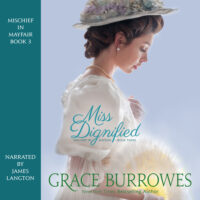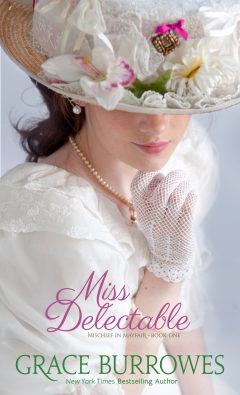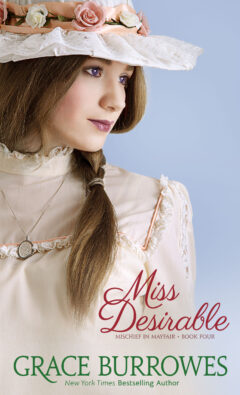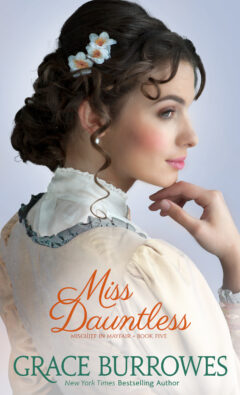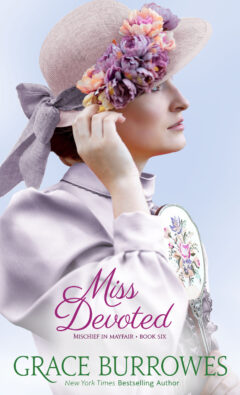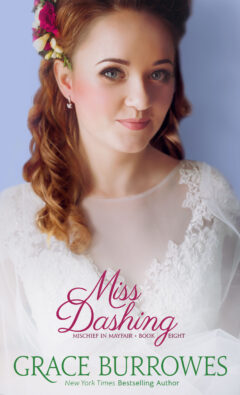Miss Dignified
Book 3 in the Mischief in Mayfair series
Lydia Lovelace has taken the housekeeper’s post in the home of Captain Dylan Powell. The captain is short on charm, but he’s known for his rapport with, and support of, former soldiers trying to make a peacetime life in London. Unbeknownst to the captain, Lydia is searching for a brother who never came home after Waterloo, a brother whose birthright, along with Lydia’s settlements, is being frittered away by scheming family members.
Dylan has never viewed his home as much more than a place to take meals and sleep out of the wet while he tries to find paying work and good positions for his former subordinates. The new housekeeper is changing all of that, bringing comfort and tranquility to Dylan’s domicile and to his days. When Dylan and Lydia begin to explore pleasures shared in the night, Lydia realizes she will have to choose between loyalty to a long-lost brother, and a future with the very man who might have sent that brother into hiding.
Enjoy An Excerpt







Chapter One
“That is a kitten.” The audacious little beast—a calico—batted at the toe of Captain Dylan Powell’s boot as if to herd him out of his own kitchen. “I do not recall giving permission to add another dependent to my household.”
And if asked, he would have refused. Half of London’s disabled and unemployed soldiers already imposed on Dylan’s hospitality, and that was quite challenging enough.
“That,” Mrs. Lydia Lovelace retorted, “is a pantry mouser, and you, Captain Powell, are intruding belowstairs unannounced again. We have discussed this. If you’re peckish, you may ring for a tray and I will happily oblige you.” In the dim light of the kitchen hearth, she gathered her shawl in a manner that conveyed vexation—with him.
Dylan’s sisters were equally skilled at wordless scolds, while he had learned to deal in orders, regulations, and precisely applied rules. Mrs. Lovelace dealt in menus, schedules, and clearly defined roles, and thus he and she rubbed along tolerably well.
Most of the time. That Dylan’s housekeeper would introduce a kitten into the household without gaining Dylan’s prior approval was insubordinate and presuming of her—also interesting.
“It’s nearly midnight,” Dylan said, “I would not trouble you over bread and cheese.”
“Bread and cheese.” She swished past him to the window box. “You hare about London at all hours, on foot, in this weather, and think to subsist on bread and cheese.” She rearranged her shawl, tossing the longer tail over one shoulder with all the panache of a Cossack preparing to gallop across the snowy steppes. “I should let you starve, but then I’d be in need of a post.”
The kitten pounced on Dylan’s boots from beneath the kitchen table, then pronked away with its back arched, while Dylan’s domestic-authority-at-large put together an omelet of ham, cheese, and bacon. At the same time, Mrs. Lovelace had a rack of toast browning over the coals, and a kettle on to boil.
For Dylan to sit, even on the hard chair before the kitchen table, was to fall prey to a staggering weight of fatigue. By a London gentleman’s standards, midnight was not late. By a soldier’s standards, midnight was hours past bedtime, and though he’d sold his commission years ago, Dylan’s body had never lost the habit of the soldier’s hours.
He rose to turn the toast—when had his hips acquired the aches of an eighty-year-old man?—and the kitten scampered after him. Rather than risk stepping on such a small pest, he scooped the beast up.
“Does it have a name?” he asked. The feline squeezed its eyes closed at him and commenced rumbling. More insubordination.
“She. Calicoes are always female, and no, she does not. Not yet.”
Dylan resumed his seat as the kitchen filled with the scents of good, simple food. “Because you think I’d turn her out?” He would, though one night out of the wet was allowable for such a tiny intruder.
The glance Mrs. Lovelace sent him was frankly skeptical. “Even you would not turn away a kitten on such a foul night.”
“It’s merely raining.” Dylan had marched through worse and barely noticed the wet.
But this rain was London rain, which could turn to sleet at any season of the year. Welsh rain was well behaved by comparison, usually more of a pattering mist, and often bringing rainbows in its wake.
Thoughts of Wales were never cheering, and never far from his mind.
“Rain with a bitter wind,” Mrs. Lovelace retorted, taking the toasting rack off the hearth. She opened the rack and began spreading butter over the warm slices. “River fog redolent of foul miasmas. Footpads on every hand. That you have not succumbed to brain fever or fallen prey to violence surely qualifies as miraculous.”
“Would you miss me?” The question slipped out, not quite teasing. Perhaps Mrs. Lovelace was right—she was frequently right, also somewhat less than respectful of her employer. The late hour, an empty belly, and the dirty weather had taken a toll on Dylan’s wits.
“I would miss my post.” She cut the buttered toast into triangles and arranged it on a plate with the steaming omelet. “You should wash your hands, sir.”
Now she gave him orders, albeit couched as a suggestion served with a side of scowling dispproval. To wash his hands, Dylan would have to stand again, and now that he was finally home and parked on his arse, even crossing the kitchen loomed like a three-day forced march.
He nonetheless set the kitten on the warm bricks of the raised hearth and went to the wet sink to do as he was told. Junior officers in particular learned to do as they were told, though half the time the result was death or disgrace—at least when the orders had come from Colonel Aloysius Dunacre.
“Will you join me?” Dylan asked, returning to the table. Mrs. Loveless had made a prodigious amount of food, more than he could comfortably eat at one sitting.
“I’ll see to the tea.”
The kitten curled up in a basket on the hearth, looking small and vulnerable all on its lonesome, also contented and sweet, damn it.
Dylan stared at the hot food, an unexpected comfort on an otherwise frustrating night. “For what I am about to receive, I am abjectly grateful. Please do sit, Mrs. Lovelace.” He cast around for a means of inducing her to get off her feet. “To have you racketing about will ruin my digestion.”
She wore no cap at this late hour, and Mrs. Lovelace did set great store by her caps. She set great store by feather dusters, recipes for lifting stains, and medicinals for every occasion. Dylan had never met a woman so ferociously competent at domesticity, nor so ruthless in her warfare against dirt and disorder.
She brought the tea tray to the table and sat across from him, perched on the very edge of her chair. “The eggs might need salt.”
Dylan portioned off a third of the omelet and set it on a saucer. “Try it for yourself. I cannot possibly finish this and good food ought not to go to waste.” He pushed the plate over to her, then added a triangle of toast. Challenging Mrs. Lovelace to bend a rule was always an intriguing exercise. She was not stupidly rigid, but rather, sensibly well organized.
Had she been running the campaign in Spain, Boney’s generals would been dusted all the way back to France within a year.
She deigned to take up a fork. “I am a trifle hungry.”
“And this assuredly does qualify as good food.” Saved from plainness by the hint of smokiness from the ham and a tangy quality to the cheese. A peculiar thought crossed Dylan’s mind. “Did you wait up for me?”
“Of course not, but on such a night, a caller or two at the back door would not be unusual.”
“This late?”
“Not usually, sir. The men would hesitate to disturb your household once the candles are out in the kitchen. Have you heard any more from your sisters about a London visit?”
That maladroit change of subject confirmed that Lydia Lovelace had waited up for him. Dylan was half pleased and half alarmed by such a possibility. In the alternative, perhaps she was plagued by dreams of cobwebs in the attics.
God knew, Dylan had his share of nightmares.
“The ladies hint,” he said, doing justice to his eggs. “They imply, they don’t quite threaten.”
“You will please inform me if that changes, sir. One wishes to be in readiness for every eventuality.”
Mrs. Lovelace ate with the sort of dainty manners a midnight snack did not merit, but then, Mrs. Lovelace was not the typical housekeeper.
She was younger than the usual exponent of her trade, and not half so substantial. In the better London domiciles, a housekeeper was a general whose influence was felt in orders followed and inspections passed. She did not ruin her knees scrubbing floors or throw out her back hauling baskets of wet laundry. The housekeeper typically had her own parlor, and from her headquarters she deployed the maids and commandeered any unsupervised male employees.
The usual housekeeper was a staff officer, in other words, and seldom found herself in hand-to-hand combat with tarnished candlesticks or dusty carpets. Mrs. Lovelace, by contrast, led her troops by example, perhaps a necessity in a bachelor’s modest quarters. Dylan had seen her in the garden laying into the hall runner with a carpet beater, dust flying everywhere.
Protracted observation led him to two conclusions regarding Lydia Lovelace. First, she got her hands literally dirty because she did not trust others to do the job right without her example. As an officer, she led the charge rather than hang back and let the enlisted men engage directly with the enemy.
Second—this insight had only come up on him recently—she maintained a prodigious level of activity in hopes that her fine looks would go unnoticed.
She had lovely dark hair shot through with auburn highlights that became apparently only by candlelight. Her complexion would be the envy of any heiress, her eyes were a green that changed hue with her moods and attire. When she spoke French, Dylan wanted to close his eyes and simply listen to her.
She poured them each a cup of tea and added a dollop of honey to Dylan’s cup. “Do you mind about the cat, sir?”
Dylan glanced over at the basket on the hearth, only to find that the calico had been joined by a ginger ball of fluff.
“Kittens, you mean?”
Mrs. Lovelace stirred her tea with inordinate care. “They were on the back stoop, Captain. I suspect one of your men brought them around. Nothing on this earth is as pathetic as a wet, bedraggled kitten unless it’s a pair of them. They huddled together, and when I opened the door they should have scampered off, but instead…”
“Instead?” To see the indomitable Lydia Lovelace reduced to explanations wasn’t as gratifying as it should have been.
“They looked up at me, all fierce and hopeful, and when I stepped back, they darted into the kitchen. I could not turn them out, sir, but I will take them to the church if you insist.”
Dylan sipped his tea, mostly to give himself time to consider options. Pets made little sense to him. Livestock had a place in the proper order of things, a well train dog could justify itself as a defense against housebreakers, and a personal mount merited appreciation, but cats…
He did not care for cats. They became too self-sufficient, when they finished being too darling and dear. Then they had kittens, made godawful noise, and left a stink about the stables. Children were probably less trouble than cats, not that Dylan would know.
“You would never allow mice on the premises, Mrs. Lovelace, and those two little wretches are months away from being able to defend the pantries.”
She pushed aside her plate of eggs, half the food uneaten. Was she saving it for the cats?
“If you insist, sir, I will make other arrangements for the kittens.”
Martyrs accepted their fates in such stoic tones. Dylan had sent men into battle, and led them into near-certain death. If Mrs. Lovelace thought he was incapable of turning out a pair of opportunistic little felines when London’s alleys were awash in tasty rodents, she had another—
A hard thumping commenced from the direction of the back door. Dylan was on his feet, mentally reviewing weaponry before the third thump: Knife in each boot, a third knife secured at the small of his back. His walking stick—mahogany, with a brass handle—sat next to the back door.
“Stay out of sight,” he muttered. “That’s an order, madam.” He chose not to take up a carrying candle lest the visitor have warning when the door opened.
The pounding continued, slow and determined. Dylan palmed the knife out of his left boot and secreted his hand in the folds his coat. He opened the door and stepped back into the shadows.
A sodden. shivering heap of humanity fell across the threshold. “Thank God. I’m s-s-sorry, Captain, but… th-th-thank God.” Dafydd Brook lay on his back, his features almost unrecognizable beneath blood and bruising. “Hadn’t anywhere else t-to go. Sorry.”
“Get him out of the wet,” Mrs. Lovelace said. “Get him out the cold and wet, and we’ll need to remove his clothes. Use your knife if you have to.”
“These are likely the only clothes he has, and I told you to stay out of sight.” Dylan got Brook beneath the arms and dragged him back far enough that Mrs. Lovelace could close the door. “Lad, can you hear me?”
“Aye, sir. I’m right enough. Just got m’ bell rung.”
Dafydd was slight, pale, and half-lame. Somebody had done much worse than ring his bell. “What the hell tempted you onto the streets at such an hour?”
“Interrogate the poor man later,” Mrs. Lovelace said, twisting the door lock. “He needs medical attention now.”
Gone was the deference of the conscientious housekeeper. In her place stood the general Dylan long suspected lurked beneath all those lacey caps.
“Best heed her, sir,” Dafydd said, as Dylan hefted the lad to his feet. “I wouldn’t want to get the business end of that poker, if I was you.”
Mrs. Lovelace gave Dylan the same sort of look the orphaned kittens had likely given her: Defiant, a little hopeful, quite fierce. She kept a steady grip on the iron poker, too.
Of all the confounded, purely female illogic… She had disobeyed a direct order, thinking to come to his aid. But then, an iron poker was a formidable weapon, even in the hands of a smallish woman.
“Come along,” Dylan said, securing an arm around Brook’s skinny waist. “Mrs. Lovelace does not tolerate insubordination. To the kitchen with you, and you can make the acquaintance of her palace tigers. I’ll fetch some brandy from the library, and we’ll have you right as a trivet in no time.”
Mrs. Lovelace braced Brook from the other side, and he was soon sitting at the kitchen table, the scent of wet wool perfuming the air.
“He’ll need dry clothes, Captain,” Mrs. Lovelace said, unbuttoning Brook’s coat while he sat inert on the chair Dylan had vacated. “Dry socks, the whole lot. I’d run him a hot bath but the water will take too long to heat. When you’ve fetched the brandy, please bring my medical box from the herbal.”
Dylan had been given his orders, a curiously comforting reversal of roles. “Mrs. Lovelace, may I make known to you Mr. Dafydd Brook, formerly of the 3rd Bicksford Regiment of Foot. I will return directly.” He quick-marched for the steps but paused before ascending. “The kittens can stay, Mrs. Lovelace. I cannot abide the thought of rodents trespassing on your pantry.”
She shooed him off, but Dylan’s artillery had hit its target. Mrs. Lydia Lovelace had smiled, however faintly, and smiled at him.
End of Excerpt
Miss Dignified is available in the following formats:

Grace Burrowes Publishing
January 4, 2022
- Grace’s BookstoreThis is Grace’s
independent
ebook store.
Your purchase can be added to any device. - Barnes & Noble Nook
- Kobo
- Apple Books
- Amazon Kindle
eBook:
Other eBook Purchase Options:
- Kobo UK
- Booktopia AUS
- Amazon UK
- Amazon Kindle UK
United Kingdom:
Connected Books
Miss Dignified is Book 3 in the Mischief in Mayfair series. The full series reading order is as follows:
- Book 1: Miss Delectable
- Book 2: Miss Delightful
- Book 3: Miss Dignified
- Book 4: Miss Desirable
- Book 5: Miss Dauntless
- Book 6: Miss Devoted
- Book 7: Miss Determined
- Book 8: Miss Dashing
- Book 9: Miss Dramatic














